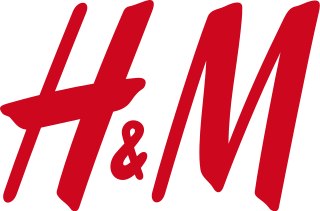
Hennes & Mauritz AB or H&M Group is a multinational clothing company based in Sweden that focuses on fast-fashion clothing. As of 23 June 2022, H&M Group operated in 75 geographical markets with 4,801 stores under the various company brands, with 107,375 full-time equivalent positions.
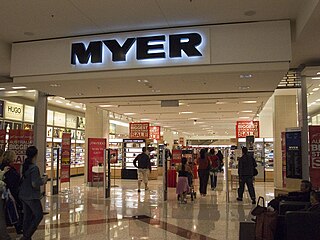
Myer is an Australian mid-range to upscale department store chain. It trades in all Australian states and one of Australia's two self-governing territories. Myer retails a broad range of products across women's, men's, and children's clothing, footwear and accessories; cosmetics and fragrance; homewares; electrical; connected home; furniture; toys; books and stationery; food and confectionery; and travel goods.
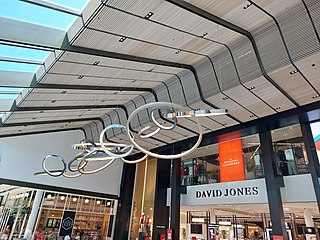
David Jones Pty Ltd, trading as David Jones, is an Australian luxury department store, the store was owned from 2014 to 2023 by the South African retail group Woolworths South Africa. In December 2022, David Jones was sold to private equity firm Anchorage Capital Partners for around $100m.
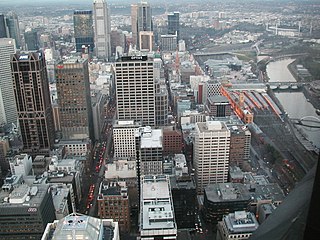
Hoddle Grid is the contemporary name given to the approximately 1-by-0.5-mile grid of streets that form the Melbourne central business district, Australia. Bounded by Flinders Street, Spring Street, La Trobe Street, and Spencer Street, it lies at an angle to the rest of the Melbourne suburban grid, and so is easily recognisable. It is named after the surveyor Robert Hoddle, who marked it out in 1837, establishing the first formal town plan. This grid of streets, laid out when there were only a few hundred settlers, became the nucleus for what is now Melbourne, a city of over five million people.

Bourke Street is one of the main streets in the Melbourne central business district and a core feature of the Hoddle Grid. It was traditionally the entertainment hub of inner-city Melbourne, and is now also a popular tourist destination and tram thoroughfare.

Bourke Place is a 224-metre (735 ft) skyscraper situated at 600 Bourke Street, Melbourne central business district, Victoria, Australia. It is the equal 11th tallest building in Melbourne and the 25th tallest building in Australia. It was completed in 1991.

William Pitt was an Australian architect and politician. Pitt is best known as one of the outstanding architects of the "boom" era of the 1880s in Melbourne, designing some of the city's most elaborate High Victorian commercial buildings. He worked in a range of styles including Gothic Revival, Italianate, French Second Empire, and his own inventive eclectic compositions. He had a notable second career after the crash of the 1890s, becoming a specialist in theatres and industrial buildings.
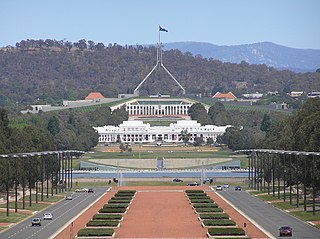
John Smith Murdoch was a Scottish architect who practised in Australia from the 1880s until 1930. Employed by the newly formed Commonwealth Public Works Department in 1904, he rose to become chief architect, from 1919 to 1929, and was responsible for designing many government buildings, most notably the Provisional Parliament House in Canberra, the home of the Parliament of Australia from 1927 to 1988.

Lonsdale Street is a main street and thoroughfare in the Melbourne central business district, Australia. It runs roughly east–west and was laid out in 1837 as one of Melbourne's original boundaries within the Hoddle Grid. The street extends from Spring Street in the east to Spencer Street in the west.

A coffee palace was an often large and elaborate residential hotel that did not serve alcohol, most of which were built in Australia in the late 19th century.
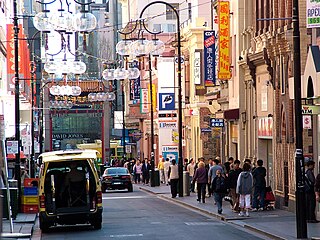
Chinatown is an ethnic enclave in the Melbourne central business district, Victoria, Australia. Centred at the eastern end of Little Bourke Street, it extends between the corners of Swanston and Spring streets, and consists of numerous laneways, alleys and arcades. Established in the 1850s during the Victorian gold rush, it is notable for being the longest continuous ethnic Chinese settlement in the Western World and the oldest Chinatown in the Southern Hemisphere.

The Melbourne central business district is the city centre and main urban area of the city of Melbourne, Victoria, Australia, centred on the Hoddle Grid, the oldest part of the city laid out in 1837, and includes its fringes. The Melbourne CBD is located in the local government area of the City of Melbourne which also includes some of inner suburbs adjoining the CBD.

Flinders Lane is a minor street and thoroughfare in the Melbourne central business district of Victoria, Australia. The laneway runs east–west from Spring Street to Spencer Street in-between Flinders and Collins streets. Originally laid out as part of the Hoddle Grid in 1837, the laneway was once the centre of Melbourne's rag trade and is still home to boutique designers and high-end retailers including Chanel, now perched alongside numerous upscale hotels like the W Hotel Melbourne and Adelphi Hotel, loft apartments, cafes and bars.
Australian non-residential architectural styles are a set of Australian architectural styles that apply to buildings used for purposes other than residence and have been around only since the first colonial government buildings of early European settlement of Australia in 1788.
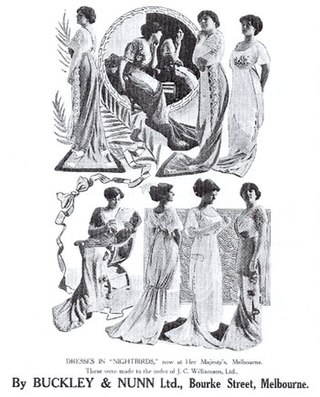
Buckley & Nunn was a department store in Melbourne, Victoria, Australia. It first opened its doors in 1851 as a drapery store and, in its heyday, competed creditably as a department store with Myer (1900). It occupied a succession of buildings on Bourke Street in Melbourne's City Centre until it was taken over by David Jones in 1982.

The T & G Mutual Life Assurance Society was an insurance company that operated in Australia and New Zealand. The 'T & G' stood for 'Temperance & General'. The company was founded in Victoria in 1876, emerging from the Assurance branch of the Independent Order of Rechabites with 132 policies. The branch was severed from the I.O.R. after six years of operations.

Foy & Gibson, also known as Foy's and later Cox-Foys, was one of Australia's largest and earliest department store chains. A large range of goods were manufactured and sold by the company including clothing, manchester, leather goods, soft furnishings, furniture, hardware and food.

Brigadier Sir Bernard Evans, was an Australian army officer, architect, builder and Lord Mayor of Melbourne (1959–1961).

The General Post Office, situated on the corner of Elizabeth and Bourke streets in Melbourne, is the former General Post Office for Victoria, Australia.

Athleisure is a hybrid style of athletic clothing typically worn as everyday wear. The word is a neo-logism combining the words 'athletic' and 'leisure'. Athleisure outfits can include yoga pants, tights, sneakers, leggings and shorts that look like athletic wear, characterized as "fashionable, dressed-up sweats and exercise clothing". Since the 2010s, it has become more common,especially in North America, to wear gym clothes outside the gym, whether the wearer is exercising or not.



















